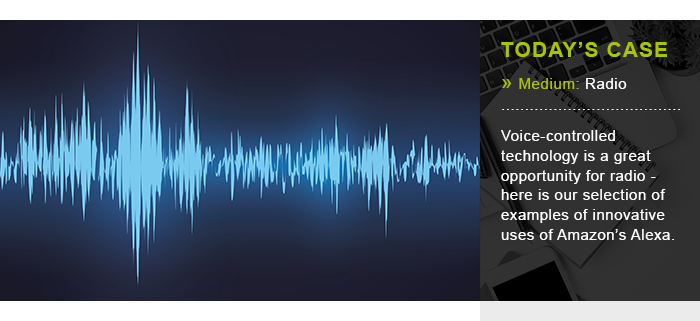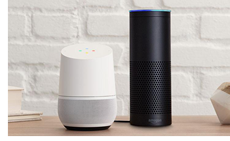|
|
||||||
| Business case studies | No 168 - 10.03.2017 |
 |
“Alexa, tell me the future of radio!” This week’s egtabite takes a look at an interesting new opportunity for radio – Amazon’s Alexa voice-controlled environment. Alexa exists in an audio-centric world, performing a variety of tasks in response to voice commands. And her integration into Amazon’s family of wireless speakers, including Echo, allows Alexa to play out live radio and on-demand audio content, serving as a hub for entertainment and information. The radio industries in the US and UK, in particular, have been quick to get friendly with Alexa, marking the start of a new voice-activated journey for the medium, a journey that may eventually change the way we interact with radios in cars, at home and on the move. Why this article deserves your attention Alexa, and other similar services such as Google Home, may not have come to your market at scale yet, but voice-controlled technology is becoming increasingly important. As these innovations start to bring more and more marketers’ attention – so long focused on the visual world – back to audio, this is an opportunity radio cannot afford to miss! The tech
Radio rolls into Alexa-world Alexa has music at her heart, with TuneIn (the default radio service), Spotify Premium, iHeartRadio and – naturally – Amazon’s own Prime Music among a number of supported services. Sensing an opportunity to build a presence in this new audio environment, the UK radio industry has made a fast entry to the fray, through its market-level UK Radioplayer platform. Radioplayer is available as an Alexa skill (Amazon’s name for the environment’s apps). When enabled, Radioplayer gives voice-controlled access to more than 450 radio stations from around the UK, allowing users to start a station by name or by recommendation based on location, what’s popular at the time or on past listening. The integration is the result of a close cooperation between Radioplayer’s R&D team and Amazon. Ensuring seamless functionality across the whole country required all of the radio stations names to be pre-recorded in a variety of regional dialects, and this attention to detail seems to have paid off in terms of a smooth user experience, according to reviews, making the Radioplayer skill more effective in selecting the right station than, for example, the default TuneIn skill. “We’ve been prototyping voice-controlled interfaces, but the Echo is by far the most capable device we’ve seen” commented Michael Hill, Radioplayer’s Managing Director, in a press release announcing the launch. “Voice interfaces will play a huge part in car dashboards and home automation devices, and they can help people with impaired vision and mobility too.” Smart radio for the smart home
Users can ask Alexa to play local newscasts, podcasts and audio from partner publishers, such as BuzzFeed, Gimlet, and Refinery29, and harness NPR One’s recommendation algorithms to discover new audio storytelling content. What’s in it for brands? Alexa already has one major commercial application baked in – the ability to order items directly from Amazon by voice command. However, Amazon is also seeking to get brands themselves engaged with the ecosystem, setting up a hub to help marketers develop their own Alexa skills. The hub lists a number of agencies with expertise in the area, including XAPPmedia – which has developed a skill for the American country music radio station B100 – and the media agency Mindshare. In an environment without a screen, where information is searched for and delivered purely in audio, how a brand sounds becomes more important than how it looks. Audio-driven technology provides radio with an excellent opportunity to strengthen its role as a strategic brand building medium for the future. One interesting application has been developed by the marketing analytics firm Datorama, which allows marketers to call up information about the performance of their advertising campaigns. This is effectively a supplementary dashboard service that enables Datorama’s clients to request information about “KPIs”, “goals” or “campaigns” during the course of a meeting, for example, without having to refer to a screen. How Alexa’s capabilities could be used to bring advertisers and radio broadcasters together is, as yet, something of an open book. It will take innovative thinking on the part of radio sales people to make these opportunities happen. However, as voice-controlled applications start to spread, particularly in connected cars, radio is uniquely well-placed to develop real added-value advertising propositions for its clients. |
|
| egta - 22, Rue des Comédiens, boîte 4 - 1000 Brussels - T: + 32 2 290 31 31 - www.egta.com |


 Alexa is an intelligent, voice-activated personal assistant developed by Amazon’s research and development division. While Alexa is supported by a large range of devices, from smartphones and smartwatches to self-learning home thermostats, Ford cars and even refrigerators, she’s probably best known as the brains inside the Amazon Echo smart speaker, which is currently available in the UK, US and Germany, as well as inside company’s Tap, Dot and Fire products.
Alexa is an intelligent, voice-activated personal assistant developed by Amazon’s research and development division. While Alexa is supported by a large range of devices, from smartphones and smartwatches to self-learning home thermostats, Ford cars and even refrigerators, she’s probably best known as the brains inside the Amazon Echo smart speaker, which is currently available in the UK, US and Germany, as well as inside company’s Tap, Dot and Fire products.


